If you're gearing up for off-grid living, consider these top five solar generators. The Jackery Explorer 1000 v2 offers a solid 1070Wh capacity and fast charging. For more power, check out the BLUETTI AC180, which features 1152Wh and multiple outlets. The EF ECOFLOW DELTA2 can handle peak demands with a 1024Wh battery. The Jackery 1000 Plus is great for sustainability with a high capacity and quick recharging. Finally, the VTOMAN 1500W is lightweight and efficient. Each of these units has unique features to power your adventures, and you'll uncover even more options ahead.
Jackery Explorer 1000 v2 Portable Power Station
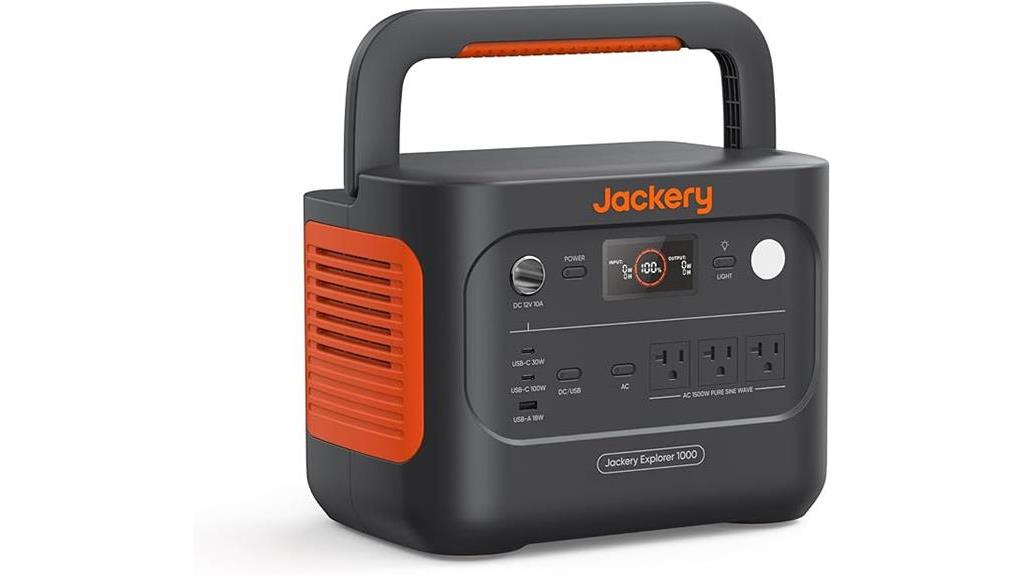
When it comes to off-grid living, the Jackery Explorer 1000 v2 Portable Power Station stands out as a reliable choice for those who need a robust and efficient power source. With a powerful 1070Wh LiFePO4 battery, it delivers 1500W AC output and 100W USB-C output, making it capable of powering multiple appliances like refrigerators and air conditioners. I love that it charges from 0% to 100% in just one hour, which is incredibly convenient. Plus, weighing only 23.8 lbs, it's easy to carry around. The Jackery App lets me manage charging modes and track real-time power usage, adding to its versatility. Overall, it's a solid option for anyone looking to enhance their off-grid lifestyle.
Best For: Those seeking a reliable and portable power solution for off-grid living or during power outages.
Pros:
- Fast charging capability allows the battery to reach full capacity in just one hour.
- Lightweight design at 23.8 lbs makes it easy to transport.
- Versatile power options with multiple AC and USB ports for various appliances.
Cons:
- Some users report a decrease in backup time compared to older models.
- Mixed reviews on the perceived power capacity of the newer version.
- Users of the original Explorer 1000 question the necessity of upgrading to the v2 model.
BLUETTI Solar Generator AC180 with 200W Solar Panel
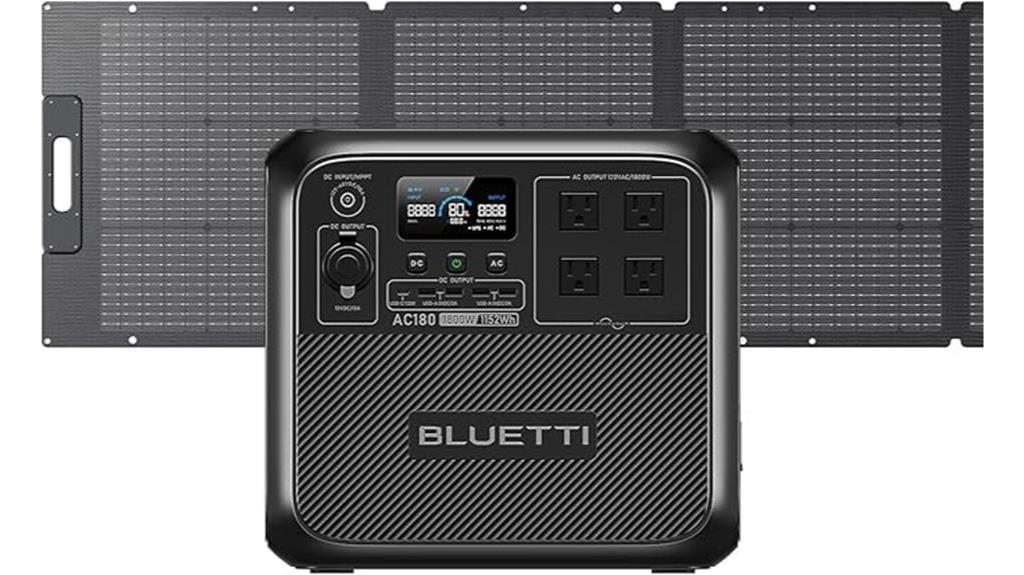
The BLUETTI Solar Generator AC180 with its 200W solar panel is perfect for anyone seeking reliable power in off-grid situations. With a capacity of 1152Wh and an output of 1800W, it can handle multiple devices simultaneously thanks to its 11 outlets, including AC, USB, and DC ports. I love that it can fully recharge in just 4.8 to 9.6 hours using solar panels, and it even has a flash charge option that gets it ready in just one hour. The LCD screen allows me to monitor power usage and battery life in real time. Plus, its sturdy design makes it ideal for outdoor adventures. Just remember, you may only access about 800Wh of usable capacity under certain loads.
Best For: Individuals seeking a portable and reliable power solution for off-grid activities or emergency backup.
Pros:
- Versatile Outputs: Equipped with 11 outlets (AC, USB, DC) to power various devices simultaneously.
- Fast Charging Options: Can recharge fully in as little as 4.8 hours via solar panels or in just 1 hour with flash charge.
- Durable Design: Built to withstand rugged outdoor conditions, making it ideal for adventures.
Cons:
- Usable Capacity Limitation: Only about 800Wh of the total 1152Wh capacity is usable under certain loads.
- Idle Consumption: Consumes 20W per hour when the inverter is ON, reducing overall efficiency.
- Mixed Solar Panel Feedback: Some users have reported issues with the solar panel functionality, leading to possible replacements.
EF ECOFLOW Solar Generator DELTA2 with 220W Solar Panel
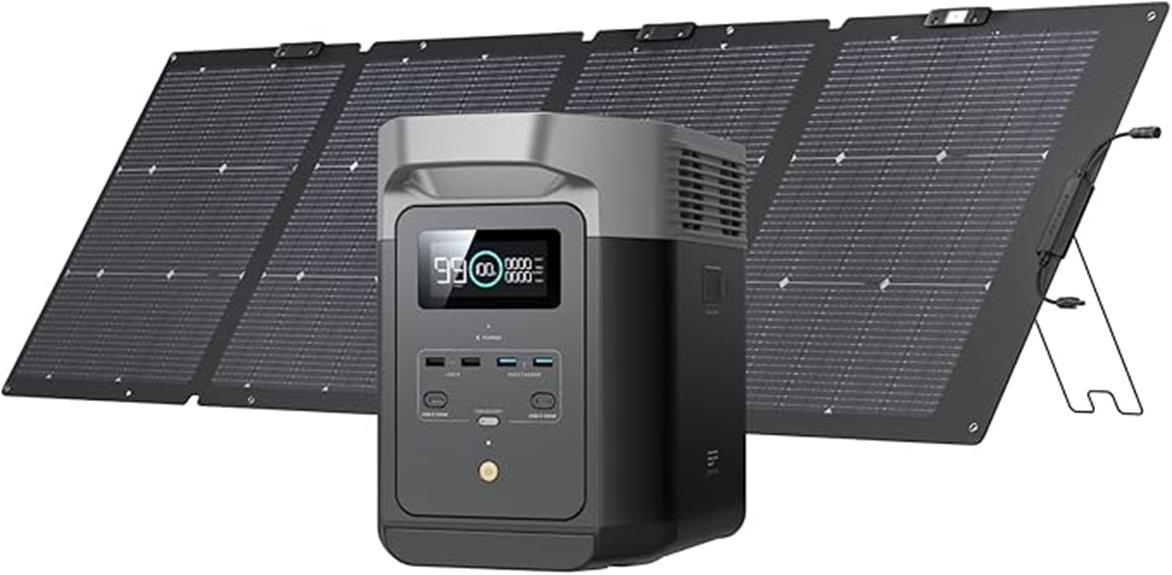
For those seeking reliable power in off-grid situations, the EF ECOFLOW Solar Generator DELTA2 with its 220W solar panel stands out as an exceptional choice. With a robust 1024Wh LiFePO4 battery, I appreciate its impressive 3000+ cycle life and ability to charge from 0 to 80% in just 50 minutes. The DELTA2 delivers a continuous output of 1800W and can handle peak demands with ease. Its 15 outlets, including USB-A, USB-C, and 12V ports, make it versatile for powering my appliances. Plus, I love that it can be expanded from 1kWh to 3kWh with additional batteries. With a solid design and positive customer support feedback, I feel confident taking this generator on my adventures.
Best For: Those seeking a reliable power solution for camping, RV trips, and home backup during blackouts.
Pros:
- Fast charging capability, reaching 0-80% in just 50 minutes.
- Versatile with 15 outlets including USB-A, USB-C, and 12V ports.
- Expandable capacity from 1kWh to 3kWh with additional batteries.
Cons:
- Higher initial investment compared to traditional generators.
- Limited to 1800W continuous output, which may not support larger appliances simultaneously.
- Requires sunny conditions for optimal solar charging efficiency.
Jackery 1000 Plus Solar Generator with Solar Panels
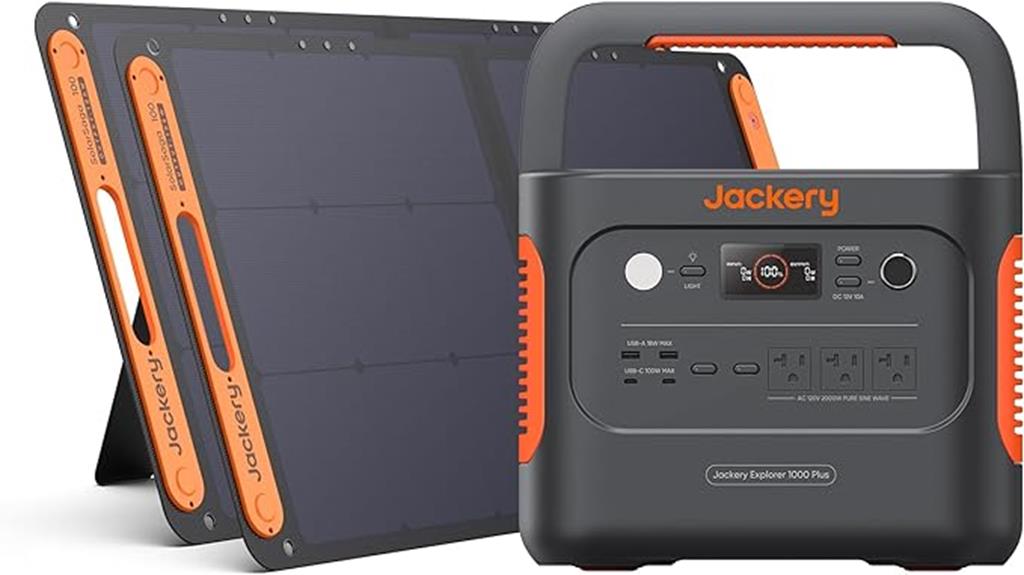
Designed with versatility in mind, the Jackery 1000 Plus Solar Generator is an ideal choice for outdoor enthusiasts and those seeking reliable off-grid power solutions. With a capacity of 1264Wh and a powerful 2000W output, it easily powers essentials like electric grills and portable fridges. I appreciate that it can fully charge in just 100 minutes from a wall outlet or in 2 hours with solar panels. Weighing around 32 pounds, it's still portable with a convenient handle. Plus, its advanced LiFePO4 battery cells guarantee a long lifespan of up to 10 years. Whether for home backup or road trips, this generator truly enhances my outdoor adventures while promoting sustainable energy.
Best For: Outdoor enthusiasts and individuals seeking reliable off-grid power solutions.
Pros:
- Versatile Power Options: Can power a wide range of devices, from electric grills to portable fridges.
- Fast Charging: Fully charges in 100 minutes from a wall outlet and 2 hours with solar panels.
- Long Battery Life: Utilizes advanced LiFePO4 cells, offering up to 4000 charge cycles and a lifespan of up to 10 years.
Cons:
- Weight: At approximately 32 pounds, it may be cumbersome for some users to transport.
- Solar Panel Design: Some users find the solar panel's easel-back flaps functional but not ideal in terms of convenience.
- Manual Availability: A hard copy manual is recommended by users for easier reference.
VTOMAN 1500W Solar Generator with 110W Panels
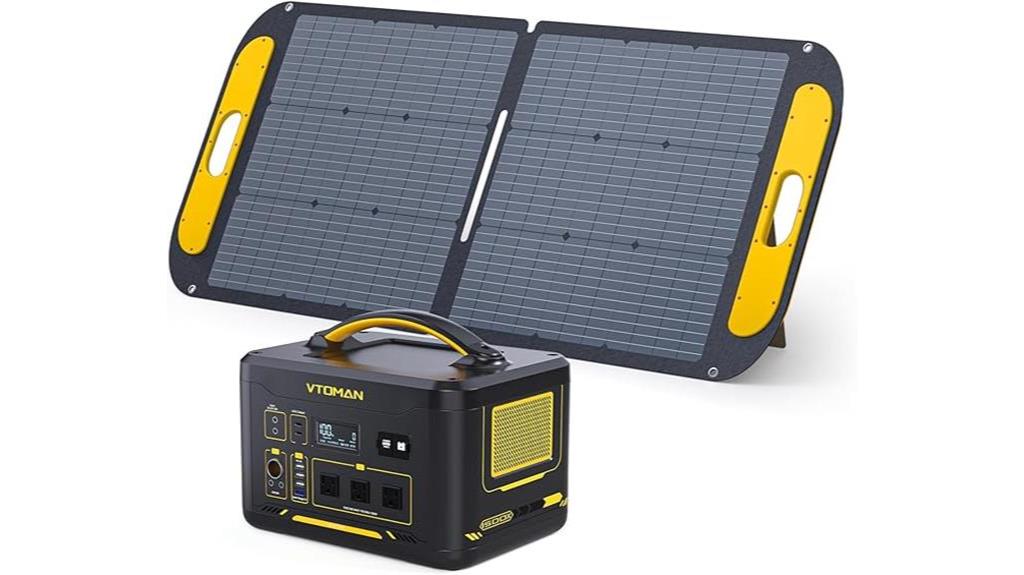
Looking for a reliable power source during camping trips or unexpected outages? The VTOMAN 1500W Solar Generator with its 110W panels might just be what you need. With a solid 1500W output and a surge capacity of 3000W, it easily powers most of your appliances, from refrigerators to laptops. The 828Wh LiFePO4 battery guarantees longevity, allowing over 3000 charge cycles. Plus, recharging is efficient; you can fully charge it in 8-9 hours with the included solar panel. Weighing only 30.8 lbs, it's portable and easy to transport. However, do keep in mind some mixed customer feedback regarding service responsiveness. Overall, it's a versatile choice for off-grid adventures and emergency backup.
Best For: Those seeking a reliable power source for camping trips, emergency backups, and off-grid living.
Pros:
- High power output of 1500W with a surge capacity of 3000W, capable of running most appliances.
- Portable design at only 30.8 lbs, making it easy to transport and set up anywhere.
- Long battery life with over 3000 charge cycles, ensuring longevity and reliability.
Cons:
- Mixed customer feedback regarding service responsiveness and reliability.
- Charging time can be lengthy, taking up to 9 hours with the included solar panel.
- Performance issues reported under specific conditions, affecting some users' experiences.
Factors to Consider When Choosing Solar Generators for Off-Grid Living
When choosing a solar generator for off-grid living, you need to take into account several key factors. Think about power output capacity, battery life longevity, and charging speed options to guarantee it meets your needs. Don't forget about portability and the number of outlets available, as these will impact how you use your generator in different situations.
Power Output Capacity
Evaluating power output capacity is essential for guaranteeing your solar generator meets your off-grid living needs. You'll want to choose a model with at least 1500W continuous output to power essential appliances like refrigerators and microwaves simultaneously. Additionally, consider the surge power rating, which tells you how much wattage the generator can handle for short bursts. A surge capacity of around 3000W is beneficial for starting high-wattage devices, making it vital for your camping or off-grid adventures.
Next, assess the usable capacity of the battery. Some generators may only allow you to use about 90% of a 1152Wh battery under certain loads, limiting your available power. To guarantee long-term reliability, look for solar generators with a battery life of at least 3000 cycles, maintaining 80% capacity, which can last up to 10 years with regular use.
Battery Life Longevity
Battery life longevity is essential for guaranteeing your solar generator serves you well during off-grid living. When selecting a solar generator, consider the type of battery chemistry used. LiFePO4 batteries stand out with over 3000 charge cycles, while Nickel Manganese Cobalt (NMC) batteries typically offer only 1500-2000 cycles. To maximize lifespan, maintain your battery charge between 20% and 80%. Letting it drop to 0% for extended periods can cause irreversible damage.
Modern solar generators can last up to 10 years with regular use, especially those equipped with advanced battery management systems (BMS) that protect against overcharging and overheating. Pay attention to the usable capacity of the battery as well; some batteries may only provide 90% of their rated capacity for effective use, which can affect how long your generator powers your devices.
Temperature extremes also play a role in battery performance and longevity. LiFePO4 batteries generally perform better across a wider temperature range than other types. By considering these factors, you can guarantee your solar generator remains reliable and efficient on your off-grid adventures.
Charging Speed Options
Charging speed plays a vital role in your off-grid experience, as it directly impacts how quickly you can replenish your solar generator. Some models can fully charge in as little as one hour when using high-wattage inputs, which is a game-changer during emergencies. You'll find that solar generators often come with multiple charging options, including AC input, solar panels, and car charging, giving you flexibility based on your available resources.
Keep in mind that solar charging efficiency varies greatly. Depending on the panel's wattage and current sunlight conditions, it can take anywhere from 4.8 to 9.6 hours to achieve a full charge. Fast charging capabilities are essential; some generators can reach 80% in under an hour, which enhances convenience. However, don't overlook idle consumption rates during charging. Some models may draw as much as 20W per hour when the inverter is engaged, which can affect your usable capacity over longer charging periods. By understanding these factors, you can choose a solar generator that suits your off-grid lifestyle and guarantees you're always powered up for your adventures.
Portability and Weight
When you're choosing a solar generator for off-grid living, portability and weight are key factors to contemplate. Most solar generators weigh between 23.8 lbs and over 30 lbs, so you'll want to think about how easy it is to transport. Ergonomic handles can make a big difference, allowing for comfortable carrying during outdoor adventures or emergencies.
Consider the design of the generator, too. Some models come with built-in wheels or rugged construction, which can enhance maneuverability when you're on the move. Don't forget to factor in the weight of any accompanying solar panels. Compact and foldable panels can save space and make setup easier, but their weight adds to your overall load.
As you plan your off-grid journey, verify that the total weight of your solar generator and panels is manageable. You want a system that meets your power needs while still being easy to transport. Balancing portability with power capacity will help you choose a solar generator that fits your lifestyle, so you can focus on enjoying your off-grid adventures without the hassle of cumbersome equipment.
Number of Outlets
As you reflect on how to power your off-grid lifestyle, the number of outlets on a solar generator becomes a significant factor. The more outlets you have, the greater variety and quantity of devices you can power simultaneously. This flexibility is vital, especially when you need to run multiple appliances like fridges, lights, and electronics at the same time.
Opt for a solar generator with at least three AC outlets. This setup allows you to accommodate essential household appliances without the hassle of constantly switching devices. Additionally, having multiple USB-C and USB-A ports is increasingly important, as many modern gadgets rely on these connections for charging. This boosts the generator's versatility, enabling you to power everything from smartphones to laptops effortlessly.
When evaluating generators, don't forget to take into account the peak output capacity alongside the number of outlets. This guarantees you can operate high-wattage devices without risking overload. Ultimately, the right combination of outlets and capacity will help you enjoy your off-grid adventures without compromising on the power you need.
Durability and Design
Choosing the right solar generator for off-grid living requires careful consideration of durability and design. You'll want a generator that can withstand harsh weather and rugged environments, so look for models made with sturdy materials and protective features, like rubber bumpers. These elements help protect your investment from the inevitable bumps and scrapes of outdoor adventures.
Portability is another key factor. A well-designed solar generator should feature ergonomic handles and compact dimensions, making it easy to transport during outdoor activities or emergencies. Confirm the model you choose has a waterproof rating, like IP68, to keep it safe from rain and splashes, enhancing its reliability.
Battery technology is essential for durability too. LiFePO4 batteries typically offer over 3000 charge cycles, guaranteeing consistent performance over time. Finally, an effective design includes a battery management system (BMS) that protects against overcharging and overheating. This feature not only boosts safety but also enhances the generator's longevity, making it a reliable companion for all your off-grid adventures. Prioritize these factors, and you'll find a solar generator that meets your needs while standing the test of time.
Frequently Asked Questions
How Long Do Solar Generators Last With Regular Use?
Solar generators can last anywhere from 5 to 15 years with regular use, depending on factors like battery quality and maintenance. If you take good care of it, keeping the batteries charged and free from extreme temperatures, you'll maximize its lifespan. Regularly checking connections and ensuring it's not overloaded also helps. So, if you're using your generator wisely, you can enjoy reliable power for a long time.
Can Solar Generators Power Appliances During Cloudy Weather?
Yes, solar generators can power appliances during cloudy weather, but their efficiency might drop. When sunlight's limited, the solar panels produce less energy, which can affect the generator's output. However, if you've got a good battery in your system, it'll store energy from sunny days for those overcast times. Just keep in mind that heavy cloud cover or storms can greatly reduce the power available for your appliances.
What Maintenance Do Solar Generators Require?
Solar generators don't require much maintenance, but you should keep a few things in mind. Regularly check and clean the solar panels to guarantee peak efficiency. Inspect the battery for corrosion and maintain the connections. It's a good idea to keep the generator in a dry, cool place to prevent damage. Also, monitor the charge levels and run the system occasionally to verify everything's functioning properly. This'll extend its lifespan and reliability.
Are Solar Generators Safe for Indoor Use?
When it comes to safety, think of solar generators as the gentle giants of energy. You can use them indoors, but you've gotta be cautious. Verify proper ventilation, as they can emit carbon monoxide if they're gas-powered. If you're using a pure solar model, you're in the clear. Always read the manufacturer's instructions and follow safety guidelines to keep your space safe and sound while enjoying the benefits of clean energy.
How Do I Determine the Right Wattage for My Needs?
To determine the right wattage for your needs, start by listing the devices you plan to power. Check their wattage requirements, usually found on the device labels. Add up the total wattage of all devices you'll run simultaneously. Don't forget to take into account surge wattage, which is higher when devices start up. Aim for a generator that exceeds this total to guarantee you've got enough power to keep everything running smoothly.
Wrapping Up
As you commence your off-grid adventures, imagine basking in the sun, knowing you've harnessed its power to fuel your journey. Whether it's the reliable Jackery Explorer or the versatile BLUETTI, each generator offers a unique path to energy independence. So, pack your bags, venture into the wild, and let these solar generators illuminate your way, turning your dreams of freedom into a vibrant reality as you explore nature's wonders without a care in the world.
